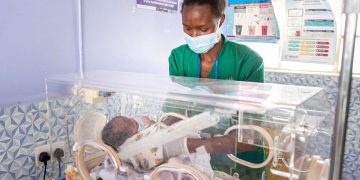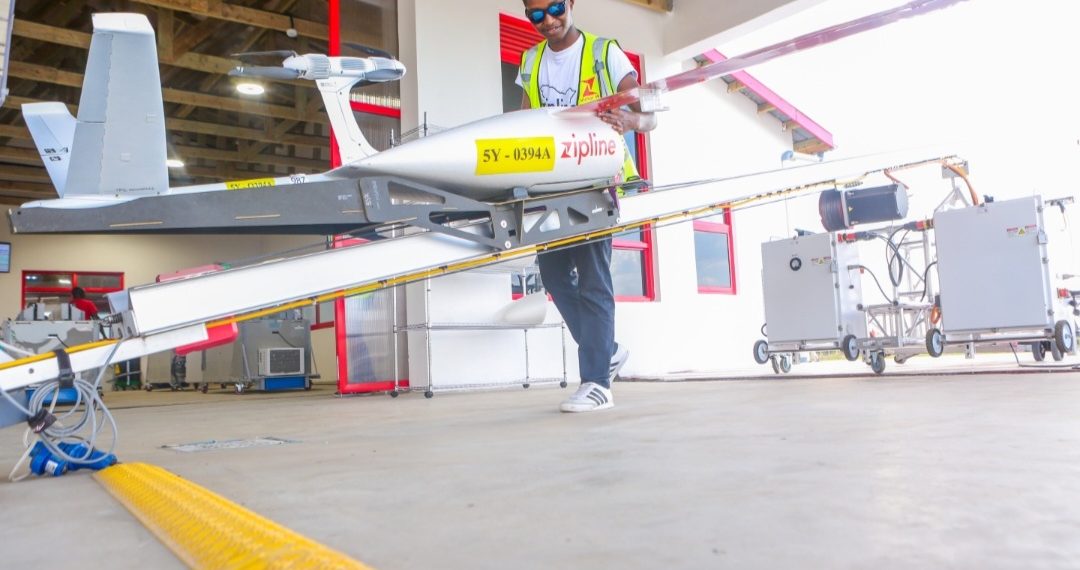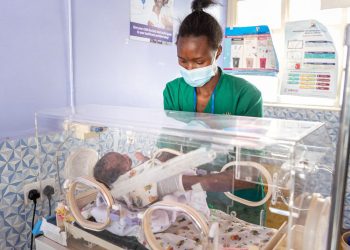In the sweltering heat of Muhoroni sub-county, Kisumu County, a patient’s life hung precariously in the balance at Masogo Sub-County Hospital. The nearest referral hospital was 50km away, and the only hope of survival was a race against time.
However, just as hope seemed to fade, a nursing officer placed an emergency order to the Zipline distribution hub located some 40km away. Within 5 minutes, a buzz filled the air as a Zipline drone descended from the sky. The unmanned aircraft swiftly delivered life-saving medication, rescuing the patient from the clutches of pain and suffering. This scene has become all too familiar since the commencement of Zipline’s drone delivery services, revolutionizing access to medical supplies in remote areas.
Kisumu County, like many regions in Kenya, faces numerous healthcare challenges. It has a population of about 1.1 million people, but only 185 health facilities and 1,200 health workers. The county also has high mortality rates from various causes, such as malaria, respiratory diseases, HIV/AIDS, maternal and child deaths. The county’s road network is often in poor condition, especially during the rainy season, when some areas become inaccessible due to floods.
Victor Olang’, a Nursing Officer at Masogo Sub-County Hospital, expressed excitement about the positive impact of Zipline’s services. “I was able to stabilize a 30 -week pregnant woman who had preeclampsia. She came in with high blood pressure, blurred vision, headache and fever. The facility was out of stock for magnesium sulfate, which I then quickly ordered from Zipline and was delivered within 5 minutes. I administered the injection and the patient’s symptoms were managed, preventing the possibility of convulsions. The patient’s caregiver (husband) was elated and thanked us.”
Zipline’s drones deliver medical supplies such as blood, vaccines, medicines and laboratory samples within minutes to any health facility within an 80-kilometer radius of the hub. The drones can fly at speeds of up to 110 kilometers per hour, and can carry up to 1.8 kilograms of cargo. The drones are also equipped with parachutes and GPS trackers to ensure safe and accurate delivery.
“Our innovative technology is playing a pivotal role in not only preserving lives but also sustaining the economic foundations of the communities we are dedicated to assisting. The profound impact of our services has fostered an even more robust connection between these communities and essential facilities. The increased demand for our services has strengthened this link even further, as attested by the firsthand accounts of dedicated healthcare workers, including community health promoters”, says Winfred Njeri, General Manager, Zipline Kenya.
The effectiveness of Zipline’s drone delivery in emergency medical scenarios is one of its most important benefits. Drones can swiftly navigate challenging terrains and reach remote health centers faster than traditional transportation methods. These drones have proven to be lifesavers in situations where every second counts by ensuring that patients receive the urgent care they require, even in the most remote locations.
Ms Suka Berylle, Zipline Kenya’s Community Lead concurs: “Our collaboration with these tireless individuals has not only heightened awareness but has also garnered widespread acceptance of the invaluable contributions that Zipline offers. The critical time lost in navigating complex road logistics, often with a life-saving medical product as the missing piece of the puzzle, has tragically resulted in the loss of precious lives. Every community harbours its own heart-wrenching tale of such instances”.
Members of the Kisumu community are also full of praise for the remarkable impact of Zipline’s services on their lives. John Onyango, a local resident, who witnessed the delivery of magnesium sulfate to the patient at Masogo Sub-county Hospital enthuses, “Yath tinde ikelonwa gi ndege” (“These days, our medication is delivered by aircraft). “We used to worry about medical emergencies, especially during the rainy season when floods cut us off from the outside world. Now, we feel safer knowing that life-saving medication can reach us quickly in times of need.”
Zipline, which has been operating in Rwanda and Ghana since 2016 and 2019 respectively, launched its commercial deliveries in Kenya in February 2023, after signing a partnership agreement with the County Government of Kisumu, a member of the Lake Region Economic Bloc (LREB). The agreement established a Zipline distribution hub in Kisumu to serve as the base of operations for its unmanned aerial system (UAS) and services, capable of serving health projects across the county and beyond.
The company’s services are not only benefiting Kisumu County, but also neighboring counties such as Nyamira, which has also signed an agreement with the company. Zipline plans to expand its operations to other parts of Kenya in the near future, with the vision of providing universal health coverage to all people.














